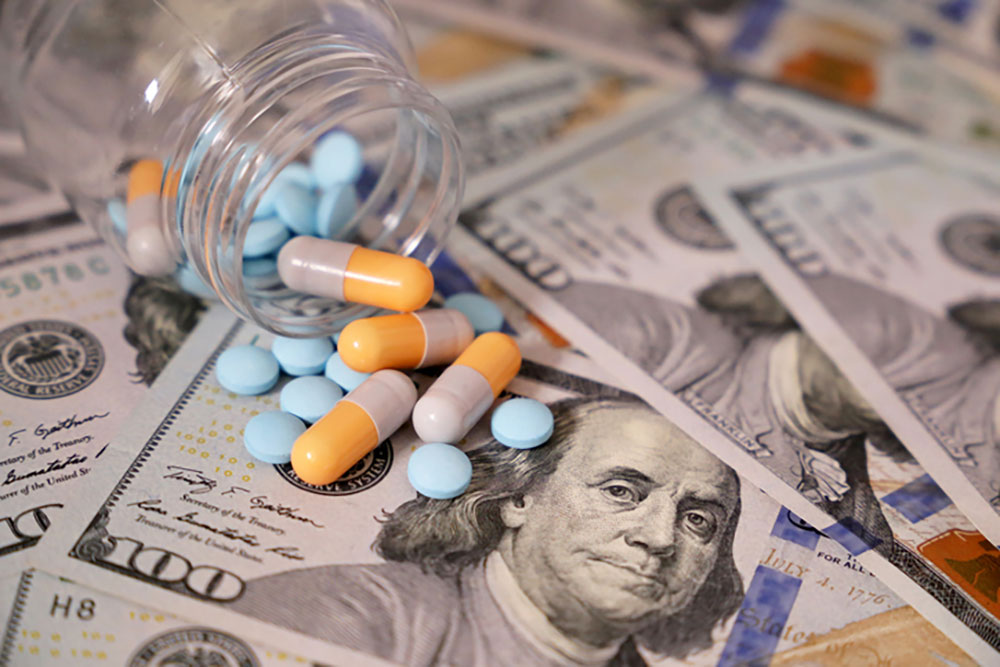
iStock
DIAGNOSED WITH a post-surgical infection, retired DC lawyer —and swing dancer— L.H. raced to the nearby CVS to fill an antibiotic prescription for Linezolid (generic Zyvox), specifically targeted at such infections. But the price at CVS, using her Medicare Plan D prescription insurance, was about $2,000 for 20 pills—down from the $3,000 retail price.
On GoodRx—one of several sites offering drug discounts—however, the price plunged to $41.89 at Giant (and at Safeway, $43.47) as of last week. Even on a discount site, though, the CVS cost remained high—$757.95. A caveat of using drug discounters is that you cannot use medication insurance in any combination payment, and whatever you pay you can’t use toward annual insurance deductibles.
When DC journalist S.G. received a prescription for mirabegron (Myrbetriq) to treat urge incontinence (UI), one form of overactive bladder, the Costco price was around $500/month ($400 on GoodRx). But a similar drug, tolterodine, cost about $40 at Costco. Moreover, it worked well, even when taken every other day and had the added bonus of helping reduce intestinal gas. “The stuff has been a miracle,” said S.G.
Drug pricing is not just out of control but complex—posing often insurmountable challenges for patients at the same time they seek urgent relief and have little ability to research the options. Prescription drug expert Michael Rea, who works with employers to find lower medication costs for workers, told the New York Times: “There’s no chance that a consumer can figure it out.”
“People are shocked to discover they can sometimes get better deals than their own insurers,” according to the New York Times. “Behind the seemingly simple act of buying a bottle of pills, a host of players —drug companies..insurers…—are taking a cut of the profits,” in up to 10 percent of drug transactions or about 40 million prescriptions per year.
“Good Rx is free!” writes thefrugalpharmacist. “Everyone can use GoodRx [even] for your pets.” At no cost to the user, average savings fall close to 50% but can reach 80%—and, with the paid GoodRx gold membership service, up to 95% on some drugs.
The pricing morass has serious ramifications, notably that hotly anticipated new drugs may take even longer to come on the market following FDA approval—at least “several months of negotiations” between insurance companies and the manufacturer, according to verywellmind. An example is the new antidepressant Auvelity— combining Wellbutrin with the ketamine-like drug dextromethorphan—that may be at the forefront of “a potential new wave of faster-acting antidepressants.”
The complexities also make it difficult to assess benefits just conferred by President Biden’s Inflation Reduction Act for those with Medicare Part D drug plan. According to the White House, benefits include lower prescription prices, because Medicare can now negotiate costs; a $2,000 cap on annual drug costs for everyone on the plan; and for diabetics, insulin costs capped at $35 for a one-month supply.
(OTC drugs have not escaped pricing craziness. After years of paying about $1 per pill for Claritin with pseudoephedrine, taken daily from early spring to late fall, I switched to generic Zyrtec GoodSense—$14.10 for 365 pills on Amazon—based on an internist’s recommendation, as well as reports from many others already in the know about this “deal.”)
My first encounter with drug-pricing quandaries involved a new drug, Vimovo, prescribed by a pain physiatrist. Not covered by Medicare, the drug combines a formulation that protects the stomach along with an NSAID, which can cause abdominal pain. My CVS pharmacist, however, explained that the cost to me would be above a shocking $2,000 for a month’s supply; instead, he suggested, he could give me a common, stomach-protecting proton-pump-inhibitor drug for around $10, which I could take along with my daily Aleve.
Next, an osteoporosis specialist recommended an infusion of the drug ReClast (zoledronic acid) but said that, with Medicare insurance, I could pay less if I had symptoms of GERD (acid reflux). Checking drug discount sites, I found conflicting information, with discounted prices from around $50 to more than $1,000. (A friend with different insurance took her ReClast prescription to CVS but only after many phone calls to her doctor and CVS could she coordinate getting the infusion to CVS and then scheduling it.) My specialist’s assistant was unfamiliar with pricing options but told me she had arranged for the hospital infusion technicians to call me. After more than four months I still have not gotten the infusion, and it appears I’m expected to research pricing myself.
I am least hopeful about overactive bladder medication for my wake-to-pee nocturia—a different form of overactive bladder than S.G. has —which, it turns out, does not respond well to tolterodine. The alternative, which operates via different receptors, could be helpful—but at what cost?
So, I’m dragging my feet, thinking I can live with the nighttime issues. Because I don’t have true osteoporosis but rather osteopenia, plus some other risk factors, maybe that drug is not urgent. Mostly, though, I’m aghast that anyone needs to go through such hoops to buy medication when they need it desperately and right away.
—Mary Carpenter regularly reports on need-to-know topics in health and medicine.
MyLittleBird often includes links to products we write about. Our editorial choices are made independently; nonetheless, a purchase made through such a link can sometimes result in MyLittleBird receiving a commission on the sale, whether through a retailer, an online store or Amazon.com.

Just another example of our horrifically dysfunctional and inequitable health care system!
Are there examples of better prescription drug distribution models that still manage to curb costs elsewhere in the world?
This is so important and depressing since it sounds as though there is no one reliable source for information about drug pricing Your citations of the various sources on the website is very useful and I will use them. Thanks, Mary.
Excellent story from M.C.
Thanks!